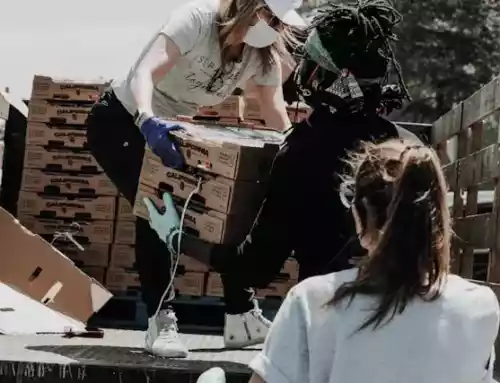
This past November I decided to teach myself how to play the bass guitar. My church owns one that I could borrow before deciding if it was something I wanted to pursue, so I didn’t have to invest monetarily in the endeavor right away. I also already play a few instruments, including violin, so I didn’t think it would be that difficult to pick up another string instrument.
Armed with some youtube videos and TAB sheets, I set out to learn this new instrument. Almost every day for the first month I got it out for even just a few minutes to play through some scales or jam along to the track of a simple song. This was even before I had an amp to plug it into, so I practiced hard even though I couldn’t always tell what my tone would be once plugged in.
At the beginning, I was so new that anything I could play was exciting. The fact that I could play along with a song at all was an improvement, and I could feel my fingers getting more comfortable with the wide spacing on the fretboard every day. I took advantage of Black Friday sales to get myself an amp so I could properly hear what I was doing, and I even used the opportunity to get my own bass too. I had decided to commit. I was going to learn the bass with the goal of being able to play it in my church’s worship band.
I felt I was making steady progress when I went out of town for two-and-a-half weeks over Christmas, and I was excited to get back to playing and continue to improve. But when I began to practice again, I found that I didn’t have the same excitement I did when I first started playing. As I gained knowledge on what the instrument should sound like, I started to hear more and more where my playing didn’t measure up. This is a good thing! Your ear should improve before your playing does so that you can hear mistakes and know when to adjust. But instead of viewing this as an opportunity for growth, I only noticed on what I *didn’t* hear and focused on my mistakes instead of my improvements.
This reminds me of when my sister tried to learn violin growing up. I had already been playing for three to four years at this point, and so she thought that she would be able to pick it up and play what she heard me practicing every day. But, as we all know, it took me a lot of time and hard work to get to that point, and she would have to go through that too. Her expectations of her ability didn’t match up with reality, and so she felt discouraged from the start.
The Project Mood Curve
In any project, we will reach a point when our expectations don’t line up with reality: when something is harder than anticipated or where we’ve worked on something and it doesn’t measure up. We call this point on the Project Mood Curve “The Pit.”
The Project Mood Curve is a sequence that we will encounter over and over again along the There-Here Path. Any relationship, project, organization, or endeavor will go through the four stages of Forming, Storming, Norming, and Performing. You have gone through this process many times and will recognize these steps, even if you weren’t consciously aware of them beforehand.
Forming is where I was when I borrowed my church’s bass to start to learn. I was excited about my new endeavor and had kind of a “scrappy” outlook. Playing without an amp or strap, I just wanted to grasp the fundamentals of the instrument. But when I decided to commit and take things a step further, I ran into some mental road blocks that impeded my progress. I had entered the Storming stage and fallen into The Pit.
I often hear people say, and have definitely said it myself a few times, that they are just simply “not good” at a given task. “I’m not a math person,” “I took piano as a kid, but I wasn’t any good at it,” or “I can’t draw,” are good examples of these. In The Pit, it’s tempting to have this outlook. It’s a place of despair because you see your own incompetencies and recognize the amount of effort it’s going to take to get There.
Instead of saying “I can’t draw,” I’ve challenged myself to instead try saying, and thinking, “I never committed myself to learning how to draw.” This does not mean that I have to or want to learn how to draw necessarily. Rather, it helps me recognize that when I look at other people’s talents and think that they are innate or that they didn’t have to work on it, that that’s not true.
The Pit is a place of despair, but it’s also a place of opportunity. It’s where you make the decision to move forward and work hard to achieve your goal, or to quit and go back to the Forming stage with a new project.
This is why it’s important to look at the Project Mood Curve in the context of the There-Here Path. If your project no longer aligns with your There, then the Storming stage is a chance to assess your goals and find something new that will get you There. However, it is important to recognize that quitting doesn’t bypass the Storming stage, because you will still have to go through it with your next endeavor.
I would say that I am currently in the Norming phase of my bass playing adventure. The way I got myself out of The Pit in this instance was by reminding myself of the fun that I can have playing this instrument and spending some time just jamming without worrying if I’m doing everything right. I recognize that I will need to spend some intentional time working on my technique in order to get to the level I want to be at. But I’ve learned to not let that desire discourage me from playing for enjoyment. In the Norming stage I’m forming habits that I will take with me into the Performing stage and figuring out what resources or boundaries I need to succeed.
The thing about the Project Mood Curve is that it is never ending. I fully expect to find myself back in The Pit with my bass-playing again once I reach the end of my skills and have to climb to reach the next level of playing. And even while I’m in a Performing phase for this project, I might be in the Norming stage for a new friend group and Storming at work. I shouldn’t try to avoid the Storming stage, because that will only delay the inevitable and may make it worse. Instead, I can acknowledge from the beginning that at some point I’m going to come to a crossroads where I will have to choose between giving up and digging in my heels to get the work done.
Gracie McBride is the Content and Systems Management Coordinator for The Crossroad.




